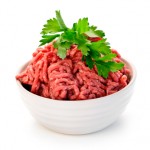Last evening I was reading The New York Times breaking news on my Kindle. I scanned several articles and then read "Linked to Outbreak." This morning the same topic was reported on the second page of The Wall Street Journal.
In brief, the Cargill company has recalled 36 million pounds of ground turkey, both fresh and frozen, believed linked to 79 illnesses and one death (so far) from contamination with the bacteria salmonella, in this case a strain of the common organism that is markedly antibiotic resistant. They've shut down one of their plants, in Arkansas, and says that's been the only one of their four turkey-producing plants involved.
That rang an alarm since I knew they had a plant in Fort Morgan, Colorado, roughly 80 miles east, where my in-laws live. I Googled Cargill and noticed there's even a branch here in Fort Collins. I found out the local branch is a research organization developing new forms of canola oil, but the Fort Morgan branch is a meat processing entity.
So I found background information on salmonella. One helpful website is a USDA Q&A four-page Fact Sheet. It mentions that salmonella bacteria are among the most common causes of foodborne illness, what we often term as "food poisoning." I'll paste in the link below, but wanted to mention some interesting background facts.
In Federal testing ten to fifteen percent of ground turkey is contaminated with salmonella and more than three fourths of those bacteria are resistant to at least one kind of antibiotic, since our current practice in raising food animals is to routinely give them drugs to prevent illness and, supposedly, to promote growth.
www.fsis.usda.gov/factsheets/salmonella_questions.../index.asp
Katic Couric has a CBS News article online (see link below) where in February 2010 she explored the question Is "Animal Antibiotic Overuse Hurting Humans?" That story centered on MRSA, a drug-resistant staph strain that has become a major problem in and outside hospitals.
http://www.cbsnews.com/stories/2010/02/09/eveningnews/main6191530.shtml
But the discussion veered off to the routine antibiotic use in other factory farm animals. One veterinarian said not every animal gets antibiotics on these huge farms, but drug distributors and dozens of farm workers in four farm belt states -Iowa, Missouri, Arkansas, and Oklahoma - said antibiotic use to promote growth is widespread on factory farms.
So what can and should we be doing in our own kitchens?
First thing is to be aware that cross contamination can occur; in other words when you're preparing raw turkey meat, your hands, utensils and cutting boards can help spread the bacteria to other foods.
Then you need to thoroughly cook these meat products, an internal temperature of 165 degrees measured with an accurate meat thermometer should be sufficient to kill salmonella, according to several government sources.
Leftovers have to be properly stored, within an hour if the ambient temperature is 90 or above, in a refrigerator at 40 degrees or below. I leave a thermometer in our refrigerator and check the temp every time I open the door. I also make sure it's fully shut after I put food in for storage.
That's a brief overview; check the links for more information.
Tags: food poisoning, medically-related food issues, salmonella


